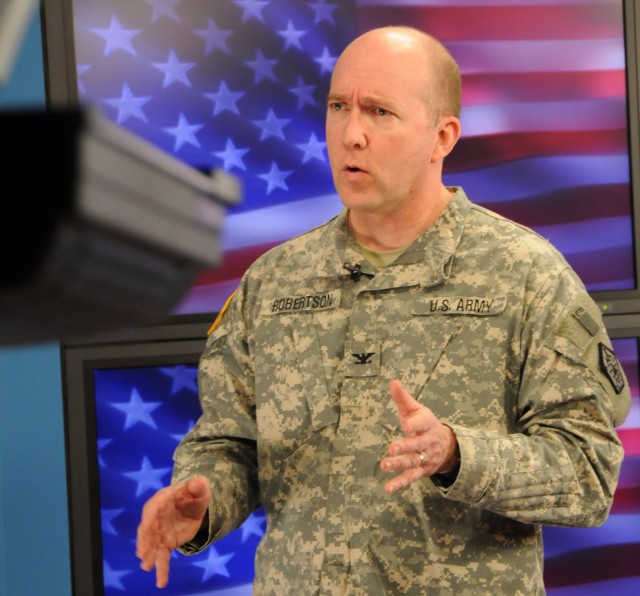
WASHINGTON (Army News Service, March 2, 2010) -- Busting myths about the officer promotion system is the current business of a small task force at Human Resources Command.
Contrary to popular belief, the only requirements by law for promotion up to colonel is a bachelor's degree, the officer basic course and time in grade - everything else is a "byproduct of Army culture," said Col. Chris Robertson, director of the Officer Personnel Management System Task Force.
"A lot of what you hear out there is total myth," Robertson said about promotion requirements. "It's myth and legend." He added that this causes "a lot of angst" about the promotion system.
Robertson and his OPMS Task Force want to change the hard time-in-grade requirements for promotion and add more flexibility for officers to take assignments outside their branch. They want to allow officers more time for joint, interagency, intergovernmental and multinational assignments, or time for graduate school and training with industry.
Officers are locked into running on a "treadmill of time" due to gates they need to meet for promotions, Robertson said in a Military Review article (November-December 2009 issue) co-authored with Lt. Col. Sophie Gainey, also of the OPMS Task Force. They said the problem is: promotion eligibility is time-based -- whenever officers hit a certain point in time, they are eligible for promotion.
Robertson and Gainey want officers to be able to slow down the treadmill or get off it temporarily in order to expand their horizons and take jobs outside their branch - such as a West Point or ROTC teaching assignment.
They want promotion eligibility to be based on competency rather than time in grade. They want officers to be able to delay promotions, if necessary, in order to take optional developmental assignments.
There's a disconnect between senior Army leaders who want officers to broaden their experience with education and commanders who believe they need good officers to stay in units and deploy every other year, Robertson said. He explained that the Army needs both types of officers for the future.
With the current operational environment, the Army needs officers who 'know how to think,' not just 'what to think,' Robertson said, adding that takes developmental experience and education.
The problem is "everyone's really hesitant to touch a promotion system," Robertson said, partly due to the old adage of 'don't fix what isn't broken.' But he said what has worked in the 1950s-era promotion system for yesterday's senior officers may not be sufficient for today's young captains. The world and operational tempo has changed significantly, he said.
"You're also running into a generational difference," Robertson said -- a generation gap.
The Army is currently short several thousand captains and majors, Robertson said, and he's determined to retain the ones currently on active duty.
More to the point, one captain with multiple deployments under his belt recently contacted a member of the OPMS Task Force and said that he's thinking about getting out of the Army unless he has time to go to school or take a developmental assignment.
That captain is by no means the exception, said Capt. Robert Greiner, another member of the OPMS Task Force who served last year in Iraq as a 1st Infantry Division transition team member attached to an Iraqi brigade. He said many captains are frustrated with the restrictive nature of their career timeline and welcome an opportunity to get off the treadmill for a developmental assignment.
Analysts may need to help model career paths and the impact of education requirements for each rank, Robertson said. He said at that point the task force will be able to gauge the "ripples across the pond" to include second- and third-order effects of career decisions.
Robertson has been discussing his recommendations with the OPMS Council of Colonels at HRC and with his counterparts in the Navy, Air Force and Marine Corps. A full legal review will be required to determine if any laws must be changed, he said. Any changes to Title X or the Defense Officer Personnel Management Act, known as DOPMA, would require support from Congress, he explained.
The next step, he said, would be submitting the OPMS proposals to senior Army leaders for approval. He said that he hopes to have all this accomplished within the year.

Social Sharing